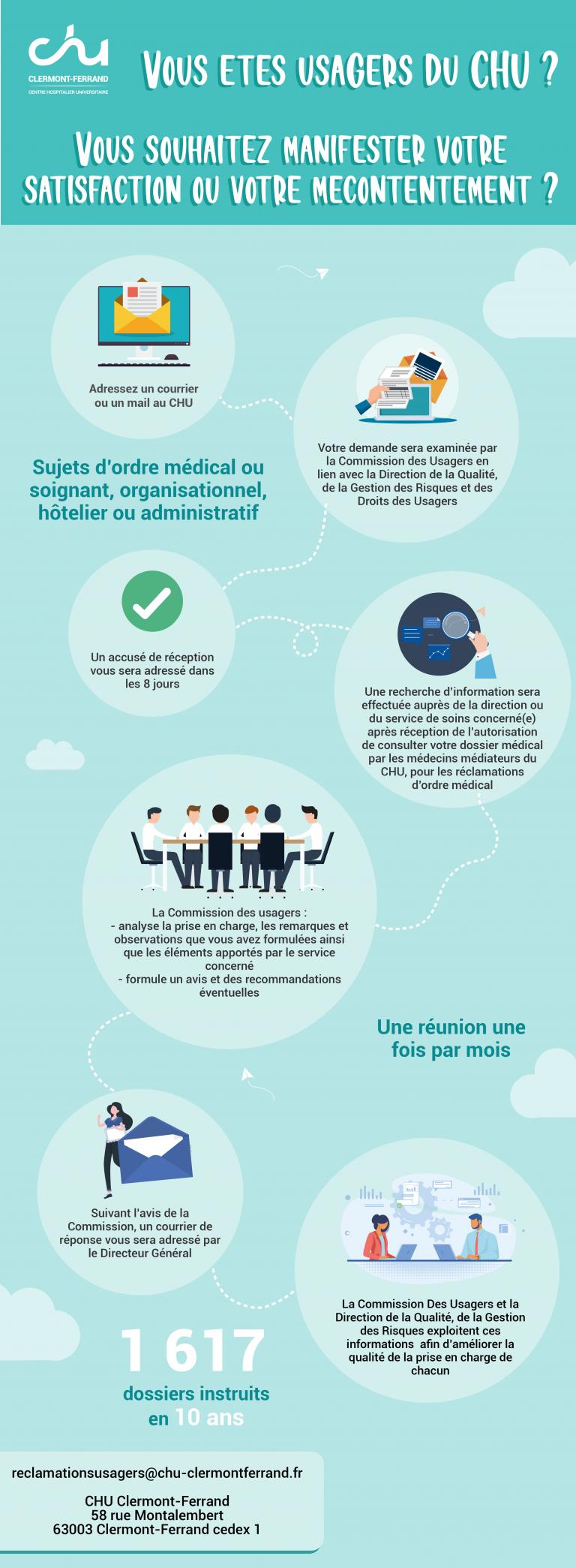Expressing your satisfaction is an important step toward improving the quality of care. Like all French healthcare institutions, the University Hospital (CHU) participates in the “E-Satis” survey (a satisfaction questionnaire), which is completed online anonymously and collected by the French National Authority for Health (HAS). The goal is to assess your satisfaction and your experience with the services provided by the CHU during your outpatient visit or hospital stay of more than 48 hours.
Data Collection
The HAS (French National Authority for Health) is responsible for processing this data. The Technical Agency for Hospital Information (ATIH) acts as a data processor, hosting the collected data. The personal data collected as part of this initiative is used to calculate indicators (satisfaction and experience scores) aimed at improving the quality and safety of care in healthcare institutions (see page xx – IQSS indicators).
The University Hospital (CHU) collects patients’ email addresses and uploads them to ATIH’s secure platform, along with the following data: gender, date of birth, hospital admission date, discharge date, and the department or unit where the patient was hospitalized. Personal data is retained for a period of 20 years. This questionnaire does not contain any directly identifying information.

By providing your email address during your hospital stay, you will receive a link from ATIH that allows you to complete the survey on a secure platform. The questions are designed to gather your opinion on the quality of care you received. Your email address will be deleted once the 12-week response period for the survey has passed.
You may choose not to provide your email address or participate in the survey. You can also unsubscribe from the secure platform and delete your email address by clicking on a dedicated link.
CHU Satisfaction Surveys
In certain departments, the University Hospital (CHU) continues to conduct its own surveys by mail, following a random selection of patients. You may receive the questionnaire at your home address.
You also have the option to share your feedback spontaneously—by mail addressed to the Department of Quality, Risk Management, and Patient Rights, through hospital staff during or after your stay, or by email at: reclamationsusagers@chu-clermontferrand.fr.
You are invited to share your experience and level of satisfaction to help improve the quality of care in healthcare institutions.
To do so, two simple steps:
- You can provide your email address during admission,
- Respond to the questionnaire, which you may receive by email or by post after your hospital stay.
Claims management
Complaints and claims from patients, their relatives, or service users may be submitted in writing and should be addressed either by post (Directeur Général, CHU de Clermont-Ferrand, 58 rue Montalembert, 63003 Clermont-Ferrand CEDEX 1) or by email (reclamationsusagers@chu-clermontferrand.fr).
Complaints and claims expressed orally or by telephone are transcribed by the healthcare professional onto a document indicating the name of the person who received the complaint and the subject of the complaint. These may concern medical, organizational, caregiving, administrative, or hospitality-related matters.
All complaints and claims are forwarded to the Quality and Risk Management Department (DQGR), which is responsible for handling and monitoring them in coordination with the Users’ Commission (CDU).
You have the option to submit a written complaint or claim by mail to the General Director of the University Hospital (CHU). All complaints and claims are then forwarded to the Department of Quality, Risk Management, and Users’ Rights. This department is responsible for processing and monitoring the complaint, in coordination with the CHU’s Users’ Commission, and will provide you with a response.
You may also contact a mediator—medical or non-medical—depending on the nature of your complaint, and be accompanied by a users’ representative who is a member of the Users’ Commission. All complaints and claims are reviewed by the Users’ Commission.
The Public Health Code governs the handling of complaints under articles R1112-91 to R1112-94, reproduced below:
Art. R1112-91
Any user of a healthcare facility must be given the opportunity to express their grievances orally to the heads of the facility’s departments. If this is not possible, or if the explanations provided are unsatisfactory, the user must be informed of their right either to submit a written complaint or claim directly to the legal representative of the facility, or to have their complaint or claim recorded in writing for the same purpose. In the latter case, a copy of the document must be provided to them without delay.
Art. R1112-92
All written complaints and claims submitted to the institution are forwarded to its legal representative.
This representative either responds as promptly as possible—informing the complainant of their right to refer the matter to a mediator—or notifies them that such a referral is being made. The legal representative also informs the complainant that they may be accompanied, during the meeting with the mediator as provided for in Article R.1112-93, by a users’ representative who is a member of the Users’ Commission.
The medical mediator is responsible for handling complaints or claims that relate exclusively to the organization of care and the medical functioning of the service, while the non-medical mediator is responsible for complaints or claims unrelated to these matters. If a complaint or claim concerns both areas, both mediators are involved simultaneously.
Art. R1112-93
The mediator, whether contacted by the legal representative of the institution or directly by the complainant, meets with the latter.
Unless the complainant refuses or is unable to attend, the meeting must take place within eight days of the referral. If the complaint or claim is made by a hospitalized patient, the meeting should, whenever possible, be held before the patient is discharged from the facility. The mediator may also meet with the patient’s relatives if deemed useful or upon their request.
Art. R1112-94
Within eight days following the meeting with the complainant, the mediator sends a report to the chair of the Users’ Commission, who promptly forwards it—along with the complaint or claim—to the members of the commission and to the complainant.
Based on this report, and after meeting with the complainant if deemed necessary, the commission issues recommendations aimed at resolving the dispute or informing the complainant of available conciliation or appeal procedures. The commission may also issue a reasoned opinion in favor of closing the case.
Within eight days following the commission’s session, the legal representative of the institution responds to the complainant in writing and includes the commission’s opinion in the correspondence. This letter is also shared with the members of the commission.
Handling of Complaints and Claims by the Quality and Risk Management Department (DQGR)

Handling of Complaints and Claims by the Quality and Risk Management Department (DQGR)
Reception Phase
- The DQGR acknowledges receipt by sending a “holding letter” to the complainant, along with a consent form authorizing the medical mediator to access the medical record. Without this authorization, the complaint cannot be processed.
- Depending on the request, the DQGR sends a medical record access request form and forwards it to the relevant site management or the medical records department.
- A copy of the complaint is sent to the relevant site management.
Information Gathering Phase
- An “information request” letter is sent to department heads, unit managers, and operational or functional directors involved.
- The DQGR keeps all complaints available for the Chair of the Users’ Commission (CDU) and reviews them weekly to ensure that the information requests have been sent to the appropriate departments.
Final Letter Phase
- The final response letter is drafted jointly with the Chair of the CDU.
Mediation Appointment Phase
- The DQGR coordinates mediation appointments for the medical mediator or alternate. These meetings are not systematic and may be requested by the complainant (at the time of the initial complaint or during correspondence), suggested by the mediator, or proposed during a CDU meeting.
Final Response Phase
- A formal response is sent to the complainant on behalf of the institution, based on the information provided by the departments concerned.
The DQGR ensures confidentiality is maintained throughout the process.
Improving the Quality of Patient Care
The analysis of complaints and claims enables the Users’ Commission (CDU) to produce an annual report, which includes recommendations submitted to the institution’s governing bodies. These recommendations are subject to follow-up and evaluation by the CDU—hence the importance of centralized handling of complaints and claims. The report is submitted to the Regional Health Agency (ARS) and the Regional Health Conference after review by CDU members and approval by the Chair of the CDU.
Recommendations for 2020:
- Reminders to pediatric emergency residents regarding department procedures (20-092);
- Involvement of senior physicians in pediatric emergency care: senior oversight of all complex situations, especially in cases of disagreement with the family regarding care decisions (20-092);
- Formal and scheduled follow-up consultations after emergency visits, provided by emergency physicians or pediatric surgeons (20-092);
- Early identification of families experiencing significant stress and early senior-level intervention in pediatric emergencies (20-092).
Recommendations for 2019:
- Reminder to all CHU staff about the importance of respecting medical confidentiality and the rules governing access to medical records (19-010);
- Raising awareness among staff regarding the signing of admission agreements (19-149);
- Reminder to ensure that cost estimates are signed before care is initiated (particularly in dentistry) (19-087);
- Optimization of outpatient surgery scheduling to reduce patient fasting times and waiting periods (19-068).